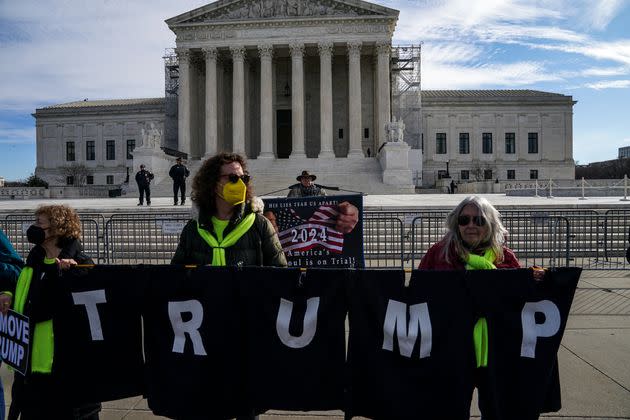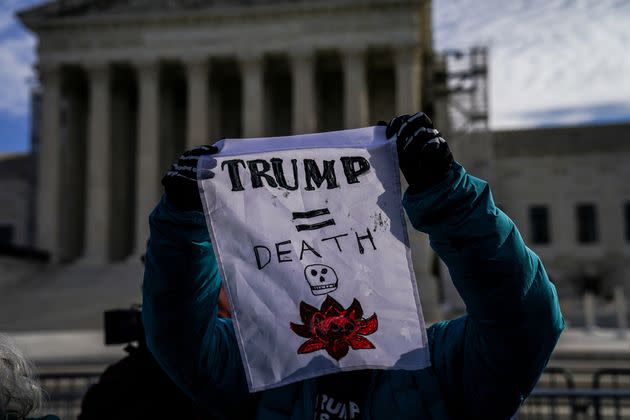Trump Might Be On The Trail — But His Actual Campaign Is Playing Out Elsewhere
Former President Donald Trump might be romping his way to the Republican nomination in state primary elections as he aims to retake the White House, but his actual campaign is happening in the courts, where he confronts real challenges. This week he faced two different cases and came out with a mixed outcome.
On Tuesday, the U.S. Court of Appeals for the District of Columbia Circuit issued its long-awaited decision on Trump’s argument that, as a former president, he has “absolute immunity” from prosecution for anything he did while in office and thus can’t face trial for his actions surrounding the Jan. 6, 2021, insurrection at the U.S. Capitol. The appeal emerged from special prosecutor Jack Smith’s investigation that led to four felony charges related to Trump’s efforts to overturn his 2020 election loss.
The panel that heard Trump’s appeal ― made up of two judges nominated by President Joe Biden and one nominated by President George H.W. Bush ― rejected, in no uncertain terms, Trump’s claim that ex-presidents can’t be prosecuted for crimes committed while in office unless they are first impeached and convicted. The judges particularly objected to the notion that a president can try to undermine the outcome of an election and face no consequences.
“We cannot accept former President Trump’s claim that a President has unbounded authority to commit crimes that would neutralize the most fundamental check on executive power — the recognition and implementation of election results,” the decision states.
The judges said that, if proved, Trump’s alleged actions afterr the 2020 election were “an unprecedented assault on the structure of our government.” His claim of absolute immunity, they said, would “collapse our system of separated powers by placing the President beyond the reach of all three Branches.”

Demonstrators outside the U.S. Supreme Court on Thursday, including Stephen Parlato, 69, of Boulder, Colorado (background), call for Trump to be kept from returning to the Oval Office.
The decision is a clear rejection of an argument so absurd that it led Trump’s lawyer to argue before the court that a president could order SEAL Team Six to assassinate his political rivals and face no legal consequences (unless impeached and convicted).
But there are parts of what could happen next — not to mention the ruling in another case — that could provide some better news for Trump’s ambitions.
Trump is expected to appeal the D.C. Circuit’s decision to the U.S. Supreme Court, potentially further delaying the start of his trial, which would itself be a net win for Trump, who is trying to run out the clock before the November election that might put him beyond the reach of federal prosecution. But the appeals panel made sure to speed things up a little bit. In its post-decision order, the panel said that Trump could not appeal to the full D.C. Circuit Court and instead had to go directly to the U.S. Supreme Court by Monday.
The Supreme Court could simply decide not to take up the case and instead let the appeals panel decision stand. That would exhaust Trump’s efforts to delay his trial and allow U.S. District Judge Tanya Chutkan in the District of Columbia to set a new date for it to begin. If, however, at least four justices agree that the court should hear the case, there could be further delay. The Supreme Court would then have to hear arguments and a decision would be issued by the end of June. There is little expectation that the court would rule in favor of Trump’s argument, but further delay would create a tight schedule for Chutkan’s court to be able to hold a trial before the November election.
But for Trump to win, he’ll have to be on the ballot. That was the subject of the other Trump case this week. The U.S. Supreme Court heard arguments on whether Colorado (and Maine) could remove Trump from their state ballots under Section 3 of the 14th Amendment. That section, added after the Civil War, prohibits people who had taken an oath to uphold the Constitution and then engaged in insurrection from holding another office of trust under the Constitution.
It was clear that the Supreme Court didn’t really want to hear this case, and you could tell by how the justices grasped for an off-ramp during oral arguments on Thursday. By the end of their questioning of lawyers for both sides, it looked like the justices had coalesced around one way out of the case: States could not exclude federal candidates from the ballot under Section 3 without authorizing legislation from Congress.

Demonstrators call for Trump to be kept from becoming president again as the Supreme Court heard oral arguments Thursday in a case involving the Colorado ballot.
This developed first from Justice Samuel Alito, one of the court’s six conservatives, who asked Trump’s lawyer Jonathan Mitchell if there was “any history of states using Section 3 as a way to bar federal office holders?”
Though Mitchell didn’t exactly follow that Alito was pushing him toward a preferred outcome, the other justices got it.
Later, liberal Justice Elena Kagan made it extremely clear that this argument had a majority of supporters on the court:
“To put it most baldly, the question that you have to confront is why a single state should get to decide who gets to be president of the United States? In other words, this question of whether this former president is disqualified for insurrection to be president again, I’ll just say it, it sounds awfully national to me. So, whatever means there are to enforce it would suggest that they have to be federal national means?”
Even liberal Justice Sonia Sotomayor, the lone member of the court who seemed open to letting Colorado keep Trump off the ballot, conceded that this argument could be the one the justices would use to reject the removal of Trump’s name.
It wouldn’t be surprising to see a 9-0 or 8-1 decision from the court in short order, putting Trump back on the ballot in the two states that have removed him.
That would allow Trump to run for president in every state. And though it’s good for him if he’s allowed on the ballot, depending on how the court handles an appeal of the D.C. Circuit’s decision, he may have to do so from behind bars.
Put these two cases together and they highlight something beyond the legal battles they are ostensibly about: Trump’s court dates are his real campaign events. The legal decisions handed down will govern his campaign rhetoric and strategy. And these trials and appeals are all governed by a time limit. If Trump wins and returns to the White House, he will become immune from prosecution as a sitting president and could even pardon himself.
As the court decisions roll in, both for and against Trump, his path to avoiding legal consequences is getting narrower and narrower. The election is his “Get out of jail free” card.

